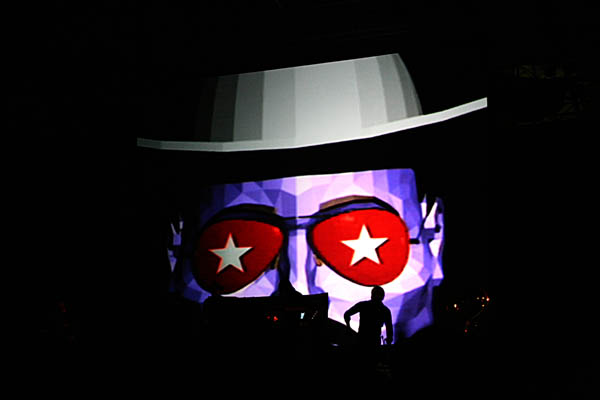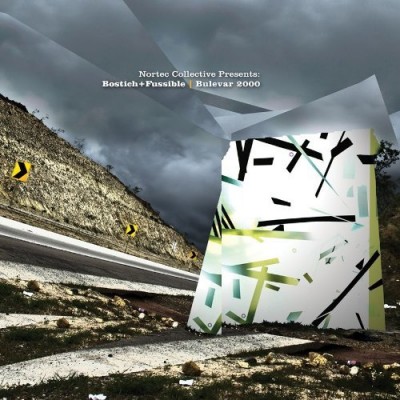Bostich + Fussible: Tijuana's Sound Machines

In the two years since I last spoke with Nortec Collective’s Pepe Mogt, aka Fussible, the iPAD-prone group has been nominated for a Grammy, two Latin Grammys, and traveled everywhere from China to Morocco and back. Which means their new album, Bulevar 2000, was written not in their beloved Tijuana, but on the road.
Pepe talked about the album experience from his hotel room in New York City, as the band prepared for their Mexican Bicentennial performance in Rockefeller Center.
_____________________________________________________________
How are you enjoying midtown Manhattan?
Nice weather. We just came from Oaxaca. It was really, really hot there, but it’s great here.
So you’re playing a big show in Rockefeller Plaza for Mexico’s bicentennial. Are you excited?
Yes, we’re going to play the music of the new album [Bulevar 2000]. We brought our regular musicians, plus some extra brass, so we’re going to be 12 people up there.
_____________________________________________________________
“I THINK NOW THE REVOLUTION HAS TO BE MORE INTELLECTUAL. NOT VIOLENT AND WITH ARMS, BUT MORE LIKE A CULTURAL REVOLUTION.”
_____________________________________________________________
Speaking of drug cartel violence, how have the narco wars influenced your music? How is it changing Tijuana?
Of course it affects you because your family is there. We knew that the violence was escalating. Imagine, we were in China or Brazil or Sweden and we were looking at the news saying, “Well 10 people were found dead without heads” or something very bad and then we contacted our friends and were told everything is okay. I guess it seems like the news puts all the bad things from everywhere and makes it sound like it’s very, very bad. But all this bad stuff is happening with people who are related to drug trafficking and government. If you’re like a regular person, you can be walking around the city and it’s safe. I think Tijuana was more violent when we were writing TSM. There were more kidnappings.
Then again, we can’t talk about flowers when our reality is another one. In the end, though, I think sometimes negative things can be transformed into something better. Not that we set out to do that, but one of the things we never expected, before we released this album, if you googled “Bulevar 2000,” you’d find all this bad news about Tijuana. About killings and all these bad things that are really shocking related to death and murder. But now that the album is released, you’ll find for the first 10 or 15 pages, news about the album, our gigs, and things we are doing. It seems like the violence on Bulevar 2000 is cleaned up. At least on the internet.
Speaking of Tijuana Sound Machine, it was nominated for a Grammy in 2008. Did that open any doors for you?
The only thing that changed was that at least we knew that our music was heard in a different forum by people we might not have expected. We were invited to go and play the Grammy after party and that was really great to be a part of that. We met all kinds of celebrities. Nicole Kidman (Laughs). It was a lot of fun for us to be there. And people who were making movies were asking to use our music. And also some gaming companies. Then we got invited to all these festivals: Austin City Limits, Coachella, and other venues with different kinds of music.
What’s next for you guys?
Bulevar 2000 was released while we were still touring for TSM so now we are in the middle of saying goodbye to the TSM tour and we’ll have a new Bulevar 2000 show in January. It’s going to be completely different, but I can’t talk about that. We want it to be a surprise. We are going to be touring a lot in Mexico, some in the US, Europe, and South America. We’re expecting a really busy year, that’s why we’re working really hard on the show because we want the new stage to represent all the things we’re talking about on the album.
Is Ramón (Bostich) stil doing dental work?
Yeah, he schedules his patients on Monday or Tuesdays because that’s when we are usually not traveling.
_____________________________________________________________
Nortec Collective Presents: Bostich + Fussible play a free concert Tuesday, October 26th from 6:30pm to 9:30pm at Rockefeller Plaza in Manhattan’s Rockefeller Center.
Also, listen to “I Count the Ways” off Bulevar 2000, featured in our Best Upcoming Albums of 2010, below.
Main photo by Flora Arias.
 How are you and other Mexicans feeling about the bicentennial?
How are you and other Mexicans feeling about the bicentennial?
 What about the songwriting? How has it influenced you there?
What about the songwriting? How has it influenced you there?